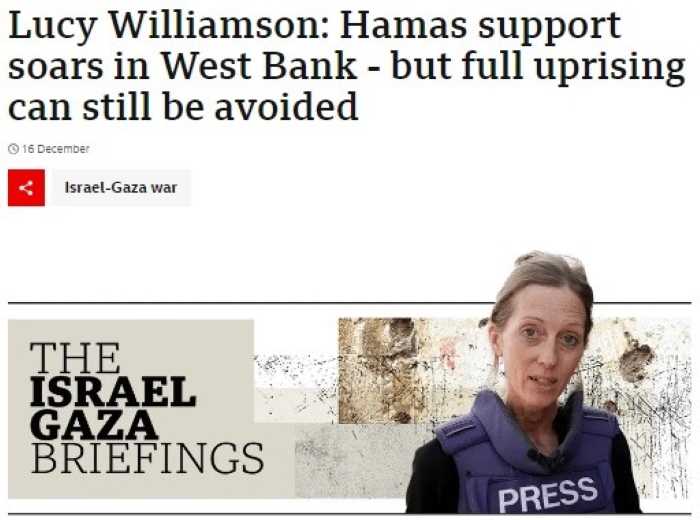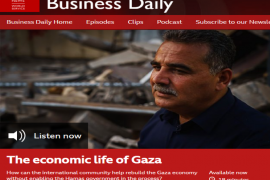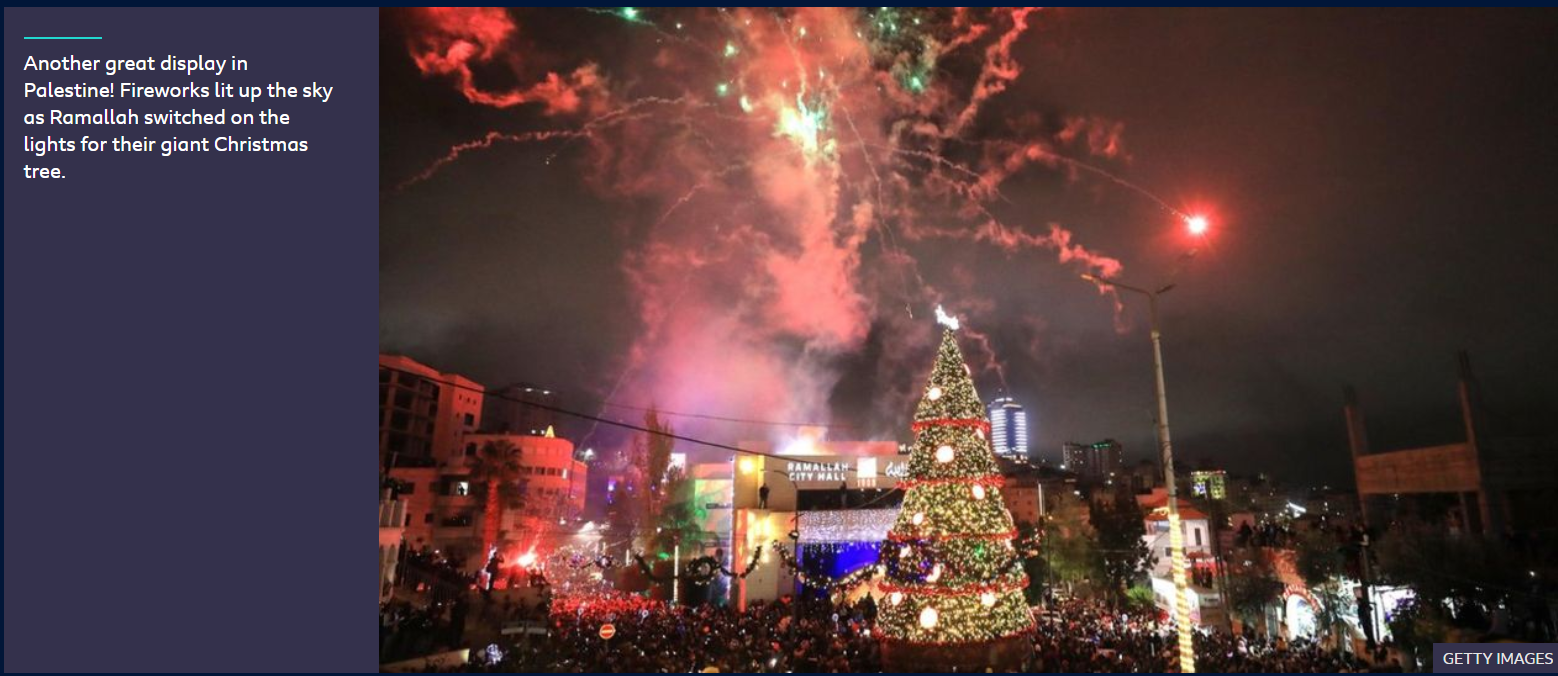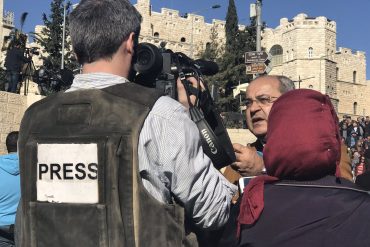Previously we discussed a report by the BBC’s Lucy Williamson which appeared on the BBC News website on December 13th:
AVOIDING THE ISSUES: BBC’S WILLIAMSON IN JENIN
On December 16th the BBC News website published one of its ‘Israel-Gaza Briefings’ written by Williamson in which she promotes some of the same contributors and talking points seen in her earlier report.
Titled ‘Lucy Williamson: Hamas support soars in West Bank – but full uprising can still be avoided’, that ‘briefing’ opens with a portrayal of the situation in PA controlled areas of Judea & Samaria which fails to fully inform readers.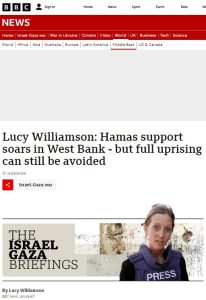
“There was speculation over whether another uprising was brewing in the West Bank, even before the Hamas attacks on Israel in October.
Frequent raids by the Israeli army, emboldened by a hard-right Israeli government – following deadly attacks by Palestinians, and violent attacks on Palestinians by settlers – had already increased pressure on Palestinians there.”
The counter-terrorism operations carried out in Judea & Samaria (which Williamson describes as “raids”) of course came in response to a surge in terrorism that began long before any “hard-right Israeli government” came to power.
While Williamson cites three different factors on the Israeli side – IDF counter-terrorism operations, a “hard-right” government and attacks on Palestinians by Israeli civilians – as having contributed to “pressure on Palestinians”, she presents only one factor on the Palestinian side: the “deadly attacks” she cannot even bring herself to accurately describe as terrorism.
As was the case in her previous report three days earlier, Williamson completely avoids highly relevant context such as the PA’s loss of control over some of the areas under its administration, weapons smuggling by Iranian backed terrorist organisations, the establishment of a ‘Joint Operations Room’ by various terror factions, the rise in involvement of members of the PA security forces in terrorism and the efforts made since 2021 by established terror groups, including Hamas and the Palestinian Islamic Jihad, to fan the flames of violence in PA controlled areas.
Williamson’s failure to include that context enables her to promote some very dubious framing from one of her repeat contributors, Khalil Shikaki:
“One young man from the [Jenin] camp, who was among those detained this week and released after questioning, said the reason people ignored calls by Hamas to rise up in solidarity was that the group did not supply the West Bank with enough equipment to fight the Israeli army.
“Hamas in the West Bank has not done a good job of organising itself over the last decade,” said Khalil Shikaki, head of the Palestinian Center for Policy and Survey Research in Ramallah.
“The Israelis have been arresting a lot of their members. Hamas is just incapable right now in the West Bank of mobilising and organising an eruption of violence that would be sustainable.””
As in her previous report, Williamson cites a recent poll by that contributor’s organisation:
“Support for Hamas – and armed resistance more generally – has risen sharply since the war in Gaza began.
An opinion poll by the Centre for Policy and Survey Research in Ramallah found that support for Hamas in the West Bank had more than tripled. Meanwhile, support for the West Bank’s ruling party, Fatah, had dropped significantly. More than 90% of respondents thought Palestinian President Mahmoud Abbas should resign.
But it seems that support for armed resistance, and disillusion with politics, is not translating into action on the ground.”
Once again Williamson fails to inform BBC audiences that – as noted by several commentators – the survey showed widespread support for – and denial of – the atrocities perpetrated by Hamas on October 7th. She also fails to clarify that one of the major reasons why “support for armed resistance” – i.e. terrorism – is, according to her claim, “not translating into action on the ground” is precisely because of the recent counter-terrorism operations which have resulted in the arrests of over 2,400 wanted Palestinians, including more than 1,200 affiliated with Hamas.
Additionally, Williamson fails to inform BBC audiences that during October and November 2023 alone, over 850 terror attacks took place in Judea & Samaria and Jerusalem – with two of the fatal incidents claimed by Hamas – before she tells her readers that:
“There is anger at almost 20,000 Palestinians killed in Gaza, and support for Hamas is rising.
But despite all this, calls by the armed group for an uprising in the West Bank over the past couple of months have come and gone.”
As in her previous report, Williamson quotes UN provided casualty figures:
“More than 270 people have been killed by Israeli forces in the West Bank since Hamas attacked Israel on 7 October – including 70 children – according to the UN. That’s more than half the total number killed this year.”
Once again she neglects to clarify that – as reported by WINEP – 123 of those killed since October 7th were clashing with the IDF at the time, 74 were participating in violent rioting and 38 were killed during counter-terrorism operations. Despite her reference to “children”, Williamson makes no effort to inform her readers of the exploitation of minors by terrorist organisations, such as the recent case in which two teens were killed in Jenin:

Williamson’s ‘briefing’ includes the curious claim that “during the last Palestinian uprising in the early 2000s” – i.e. the second Intifada – demonstrations took place “at checkpoints” – most of which were of course established as a result of that terror war. She also promotes a long-standing and often repeated BBC falsehood concerning the “spark for the second Intifada”:
“In 2000, the spark for the second intifada was a visit by then-Israeli prime minister Ariel Sharon to a contested holy site in Jerusalem, known to Muslims as the al-Aqsa compound and to Jews at the Temple Mount.”
Williamson continues:
“Sharon’s visit happened amid smouldering Palestinian frustration at the failure of the Oslo peace process – and, Dr Shikaki says, was “exploited” by Fatah’s young guard to launch the uprising.”
Williamson does not inform readers that it was the Palestinian president Yasser Arafat who had caused the negotiations at Camp David in the summer of 2000 to reach a dead end or that there is ample evidence to show that the intifada was planned months before Ariel Sharon even thought of paying a pre-coordinated thirty-four minute visit to Temple Mount during normal opening hours.
Under the sub-heading “The role of Fatah”, Williamson tells her readers that:
“The US is pushing Israel to allow a “revitalised” PA to govern Gaza once the war there ends. Israel has so far said it will not consider it.
But the chance to govern a unified Palestinian bloc for the first time since 2006 is another incentive for the Fatah-dominated PA to prove its credentials and stop the situation in the West Bank from spiralling out of control.”
She of course neglects to mention that reasons why Israel might be opposed to the PA being brought in to govern the Gaza Strip after the war could include its policy of payments to terrorists and their families, its record of incitement and glorification of terrorism (including by one of Williamson’s three Palestinian contributors, Sabri Saidam) and its refusal to recognise Israel as the Jewish state.
Williamson provides Saidam with an unchallenged platform from which to promote the claim that Israel’s prime minister “wants to provoke the Palestinians into a confrontational mood that he will use as an excuse to escalate the situation” and she apparently saw no problem with his specious framing of Hamas’ October 7th attacks as a response to what she herself describes as “far-right ministers in the Israeli government” visiting Temple Mount and making “inflammatory claims about Israeli control of the site”.
Likewise, Williamson chose to amplify the claim from the terror supporting political activist Raed Debiy whereby any “sustained uprising” in PA controlled areas will be the result of a lack of political horizons for which, of course, Israel alone is to blame.
‘”If we had anything on the political agenda, things could go quiet,” Raed Debiy told me. “But I’m not sure with this right-wing [Israeli] government whether there is anything solid on the table – so the only scenario I see is explosion. It’s just a matter of time.”’
Like so many of her colleagues, Williamson patronisingly refuses to acknowledge that the Palestinians have responsibility and agency and instead promotes simplistic framing whereby their sole option is to respond to Israeli actions.
It is hence unsurprising that in a ‘briefing’ in which BBC audiences are led to believe that Palestinian terrorism is a response to Israeli counter-terrorism operations and that the unprecedented massacre of Israeli civilians perpetrated by Hamas and the second Intifada were both responses to Israeli politicians visiting a holy site, the likelihood of another wave of violence is portrayed as being dependent on anything Israel may or may not do rather than on choices made by Palestinians themselves.
Related Articles:
AN UNHELPFUL BBC BACKGROUNDER ON ‘ISRAELI-PALESTINIAN VIOLENCE’

